Opinion: I saw what climate change hell looks like. Now I’m joining the Global Climate Strike. You should too

On Friday, more than a million people are expected to walk out of their schools and homes and off their jobs. I will be one of them. We join the Global Climate Strike, a worldwide call to action, a demand for climate justice and real political solutions. We strike because we have a grievance — the climate crisis. We strike because the cause of the crisis is clear, and it demands the most urgent action of our lifetime.
As individuals, we do not wield the political power of the fossil fuel industry. Oil and coal companies give millions of dollars to campaigns for policy favors, and their executives sit in the highest levels of government. Alone, we cannot match their influence. We strike because linked together our voices cannot be ignored.
I strike because I am scared.
I thought it was snow, before the smoke rolled in off the Santa Barbara hills. Soft white flakes dissolved into my coffee, and with the other students on the cafe patio, I looked to the sky for an explanation. Whispers spread: fire. The Thomas fire. In 2017, it was the largest fire on record in California history.
The week before finals, we normally receive Scantron handouts and study snacks. It was my junior year of college, and Student Health distributed masks in front of the library, a small consolation from a silent university administration. Smoke drifted through the library’s double doors, ash swept across the reference desk. We had to wear the masks inside too.
From the seventh-floor study room, my favorite for the view, smoke clung to the glass. A small sun sank into an ocean rippled red. Anxiety tingled between us. Students shouted updates across the room as freeway exits closed, each one closer than the last. Each of us had one tab on our laptops opened to Cal Fire and another to our final essays. Our phones buzzed in unison with the latest evacuation notices. We all had the same thought: It feels like the end.
My last class of the quarter, blackouts interrupted the environmental policy lecture. “This is a better lesson on climate change than I could teach,” the professor said. “Go home.” I did go home, because I could not breathe. Each deep breath brought sharp pain, fine particulate matter seeped through the cheap masks and pierced my lungs. I loaded up my valuables and the last gallons of water from 7-Eleven, washed ash from my windshield and abandoned Isla Vista.
Wildfires lit a runway down Highway 101. Night seemed to fall by 2 p.m. and the high beams only illuminated more smoke. My attention shifted between the road and the monster devouring the Santa Barbara hills. I did not understand fire until I watched it swallow entire trees, heat bright and radiating through the driver’s window.
I strike because at 21 years old, I drove alone into an inferno. I saw hell on Earth between the mountains and the ocean, and I watched it again in Napa and Paradise. I strike because California is a tinderbox. I fear I will live to see the biggest wildfire in state history once again, but I will not have an escape route to my family home. I returned to UC Santa Barbara after an eight-hour detour around Montecito mudslides. I was lucky to come back to an apartment building still standing.
Luck is fickle, and I cannot count on luck again.
I strike for the millions who experience climate change devastation. I strike for the climate refugees in our state and at our southern border. I strike for my younger brothers and my future children: For a chance to live a life. I do not want to drive through the night with a wildfire and sleeping children in my rearview mirror. I do not want to shuffle my family across state lines, following a North Star to the promise of safety and fresh water.
I strike because we have 11 years left. Last year, an international panel of climate scientists warned we had 12 years to dramatically reduce carbon emissions to avoid a 1.5 degrees Celsius global temperature increase. An Earth even that much warmer promises sea-level rise, category five hurricanes, mass animal die-offs, wildfires, famine and drought. I strike because I demand real solutions and security in my future. I strike for a Green New Deal.
The Green New Deal is a necessary response to the climate crisis after decades of inaction from the U.S. federal government. It is a policy designed to confront climate change based on the seriousness of the science. The Green New Deal will clean up our electricity system with renewables, lay accessible and convenient public transportation, and renovate our homes and buildings for energy efficiency, all the while creating millions of well-paid jobs. The Green New Deal is more than a future I want. It is a future I need. I am only 22.
For me, for you, for your children and their children too, demand a solution to the climate crisis. The world is on fire and the ocean is rising. Strike with us.
Nikayla Jefferson, a recent UC Santa Barbara graduate, is a member of the Sunrise Movement in San Diego, a national organization that advocates for political action on climate change.
More to Read
A cure for the common opinion
Get thought-provoking perspectives with our weekly newsletter.
You may occasionally receive promotional content from the Los Angeles Times.










